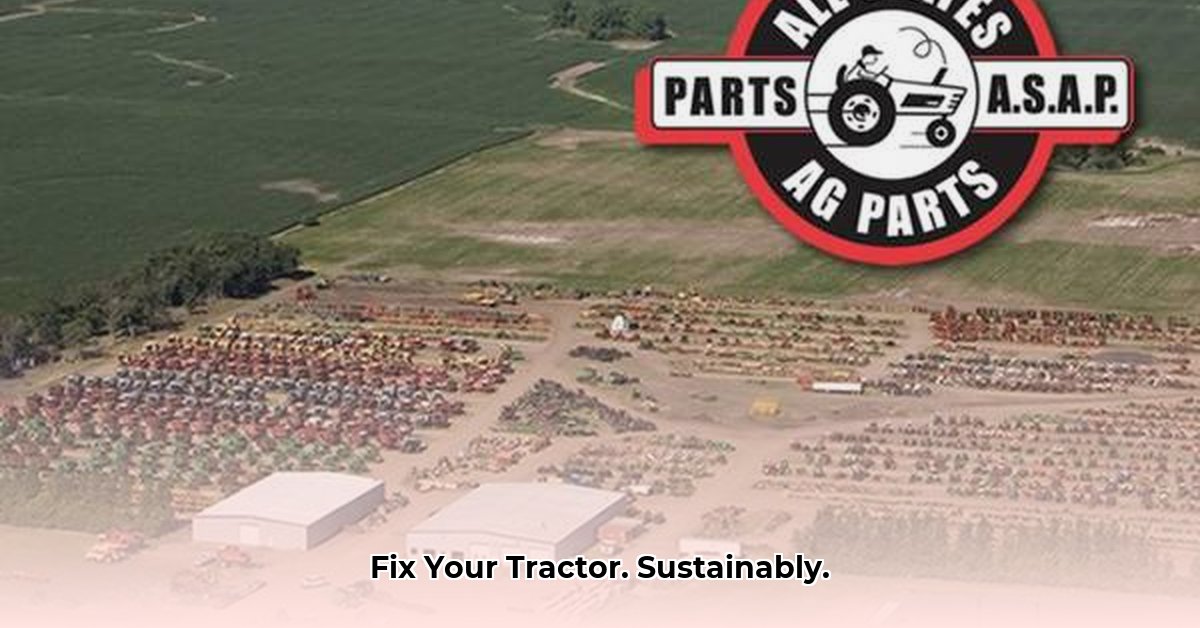
Salem Tractor Parts, located in Salem, South Dakota, plays a crucial, often overlooked, role in sustainable agriculture. By providing essential repair services and parts for farm equipment, they contribute significantly to extending the lifespan of machinery and reducing waste. This case study examines their operations, identifies opportunities for improvement, and proposes actionable recommendations to enhance their sustainability impact. For broader South Dakota agricultural supply options, check out nearby Tractor Supply.
Part Availability: Extending Equipment Lifespan
Salem Tractor Parts offers a range of parts—new, rebuilt, and used—catering to the diverse needs of local farmers. This diverse inventory is a key component of their contribution to sustainable agriculture. By providing readily available options, including rebuilt and used parts, they empower farmers to repair rather than replace their equipment, ultimately reducing waste and lowering the carbon footprint associated with manufacturing new machinery. While precise sales figures for each part type are unavailable, anecdotal evidence suggests a strong emphasis on repair and reuse, aligning with sustainable practices. Further data collection on part sales percentages would strengthen this analysis.
Farmer Feedback: A Foundation for Improvement
Customer satisfaction is paramount. Salem Tractor Parts boasts a respectable 4.4-star rating based on 11 online reviews. Positive feedback consistently highlights prompt service and high-quality parts. These positive testimonials underscore the importance of reliable repairs in maintaining operational efficiency and reducing the need for equipment replacement. However, opportunities for improvement exist. For example, enhancing online ordering capabilities and expanding business hours could further enhance customer experience and loyalty. Additional customer surveys, focusing on specific aspects of service and sustainability, could provide valuable insights.
Sustainability Initiatives: Unleashing Potential
While Salem Tractor Parts' primary contribution to sustainability stems from facilitating equipment repair and reuse, explicit, formalized sustainability initiatives are absent. This presents a significant opportunity for growth. Implementing a comprehensive sustainability strategy could significantly boost their environmental impact. Specific actions could include:
- Parts Recycling Program: Establishing a system for collecting and repurposing used parts, minimizing landfill waste.
- Energy Efficiency Audit: Identifying and implementing energy-saving measures within the shop, reducing energy consumption and operational costs.
- Sustainable Sourcing: Prioritizing suppliers committed to environmentally friendly manufacturing practices.
These measures could transform Salem Tractor Parts into a leader in sustainable agricultural equipment repair.
Geographic Impact: Expanding the Reach of Sustainability
Salem Tractor Parts' current focus on the local area limits its overall impact. Expanding its service area, perhaps across South Dakota, would yield considerable sustainability benefits. A wider reach would reduce the transportation burden associated with sourcing parts from distant suppliers, minimizing fuel consumption and greenhouse gas emissions. Strategically expanding their operation while maintaining quality represents a significant opportunity for broader environmental benefit.
A Roadmap for Sustainable Growth: Actionable Recommendations
To maximize both sustainability and profitability, a collaborative approach is crucial. The following table outlines recommended short-term and long-term goals for key stakeholders:
| Stakeholder | Short-Term Goals (0-1 year) | Long-Term Goals (3-5 years) |
|---|---|---|
| Salem Tractor Parts | Implement parts recycling program; conduct energy audit; enhance online presence/e-commerce. | Explore sustainable supplier partnerships; invest in employee sustainability training; conduct carbon footprint analysis. |
| Local Farmers | Prioritize repairs over replacements; explore equipment sharing cooperatives. | Adopt sustainable farming practices; cooperate on parts purchasing. |
| South Dakota Government | Offer incentives for sustainable agricultural practices; fund research on sustainable materials. | Invest in infrastructure for parts recycling; fund R&D for eco-friendly agricultural equipment parts. |
Challenges and Risks: Mitigating Potential Obstacles
Salem Tractor Parts faces several potential challenges:
- Inventory Management: Balancing sufficient stock to meet demand with minimizing storage costs and obsolescence.
- Supply Chain Disruptions: Maintaining a reliable supply of parts despite potential disruptions.
- Environmental Liabilities: Ensuring responsible disposal of hazardous materials.
- Competition: Maintaining a competitive edge in a dynamic market.
Proactive planning and robust contingency strategies are essential to mitigate these risks and ensure long-term sustainability.
Conclusion: A Vision for Sustainable Agriculture
Salem Tractor Parts, while currently operating without a formal sustainability strategy, holds immense potential to significantly contribute to sustainable agriculture. By implementing the recommendations presented, they can strengthen their positive impact on the environment and build a more resilient and prosperous business. The journey toward a more sustainable future requires continuous improvement, and Salem Tractor Parts is well-positioned to lead the way.